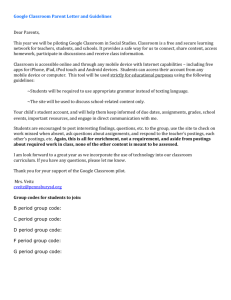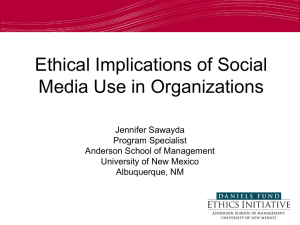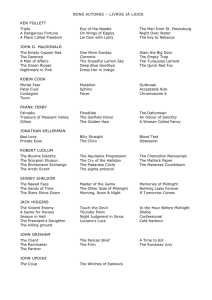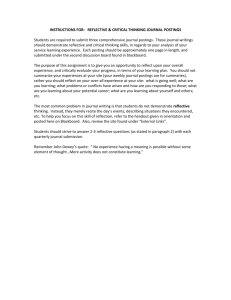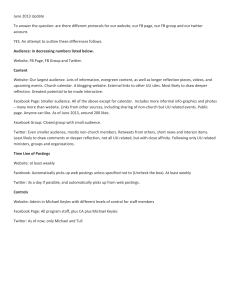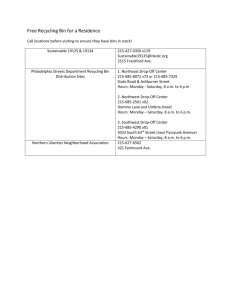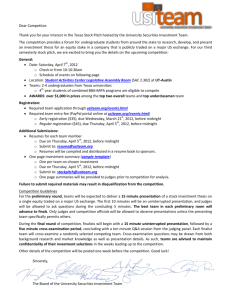BADM 612 - WVU College of Business and Economics
advertisement
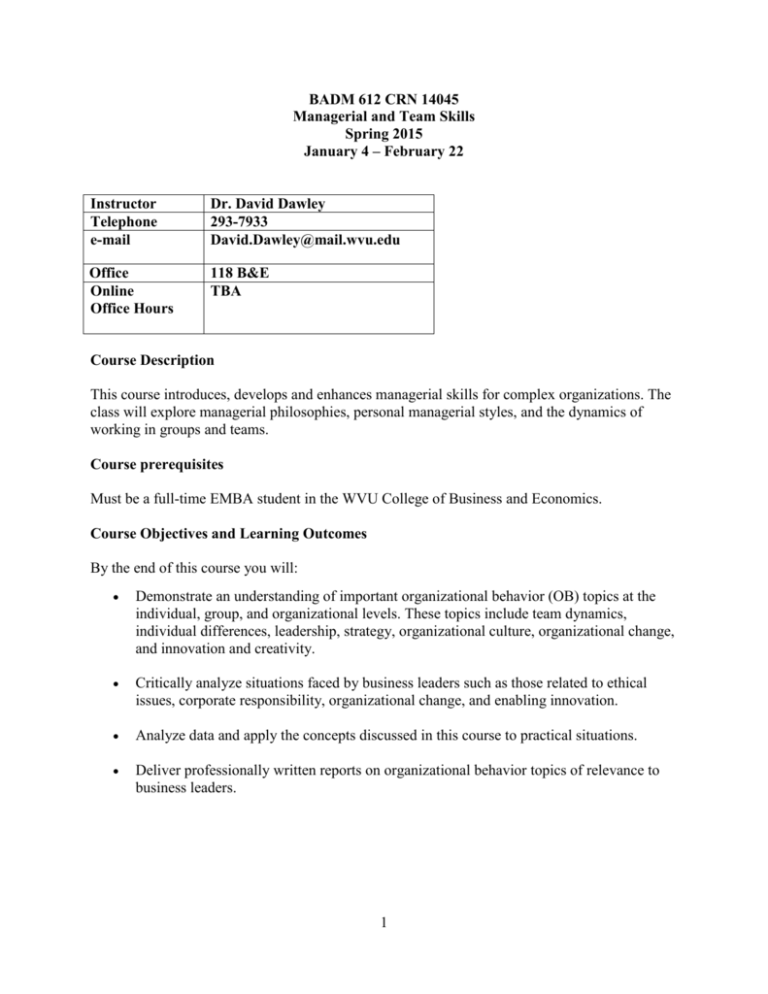
BADM 612 CRN 14045 Managerial and Team Skills Spring 2015 January 4 – February 22 Instructor Telephone e-mail Dr. David Dawley 293-7933 David.Dawley@mail.wvu.edu Office Online Office Hours 118 B&E TBA Course Description This course introduces, develops and enhances managerial skills for complex organizations. The class will explore managerial philosophies, personal managerial styles, and the dynamics of working in groups and teams. Course prerequisites Must be a full-time EMBA student in the WVU College of Business and Economics. Course Objectives and Learning Outcomes By the end of this course you will: Demonstrate an understanding of important organizational behavior (OB) topics at the individual, group, and organizational levels. These topics include team dynamics, individual differences, leadership, strategy, organizational culture, organizational change, and innovation and creativity. Critically analyze situations faced by business leaders such as those related to ethical issues, corporate responsibility, organizational change, and enabling innovation. Analyze data and apply the concepts discussed in this course to practical situations. Deliver professionally written reports on organizational behavior topics of relevance to business leaders. 1 REQUIRED MATERIALS: Students are required to read the notes, articles and cases assigned for different topics as specified in the Syllabus and on the Course Calendar. You will need to purchase the Harvard Business School cases from the Harvard Business School Publishing website. In order to purchase the cases for the course, you will need to follow the case link below. When prompted, you will need to register with Harvard Business Publishing. After you have registered, you will log in using the Username and Password you selected in the registration process. You are required to purchase the five cases for the course ($3.95 each). Harvard Business School Cases: Philips versus Matsushita: The Competitive Battle Continues - Product Number: 910410PDF-ENG Coach Knight: The Will to Win – Product Number: 406043-PDF-ENG The Army Crew Team - Product Number: 403131-PDF-ENG FIJI Water and Corporate Social Responsibility - Green Makeover or "Greenwashing"? – Product Number: 909A08-PDF-ENG Fire at Mann Gulch – Product Number: 304089-PDF-ENG Harvard Business School Cases may be purchased online at a cost of $3.95 per case. The web address for purchasing the entire coursepack is: https://cb.hbsp.harvard.edu/cbmp/access/32071899 Harvard Business School Articles: These articles will be made available through the course e-campus website, and are also available from WVU Library. CASE EXECUTIVE SUMMARIES: Each student should complete an executive summary for the discussion case assigned for most modules. Summaries should be no longer than 2 single-spaced typed pages; one page will usually suffice. The primary purpose of the executive summary is to prepare you for participating in the online discussions. While you will write the summaries in essay format, I want you to follow this general format for each case summary: Define the problem Formulate alternatives Analyze the alternatives Recommend a solution 2 ONLINE DISCUSSION OF TOPICS, ARTICLES, AND CASES You earn points in this category by fully participating and being involved in online discussions on a regular basis. Much of our learning this semester, including mine, will come from each other. Consequently, you are encouraged to tell the class about your own work experiences that are consistent or contrary to the issues raised on the discussion board. I am interested in both quality and quantity of contributions, and I will keep track of both throughout the term. To receive credit, you must regularly add to the class discussion in a meaningful way. Discussion Board Participation Participation in online discussions is mandatory. In order to actively participate in these discussions, you will need to log on 4-5 times per week. This will help you stay up-to-date on the discussions and allow you to make more thoughtful postings. Discussions begin on Monday each week and end on Saturday at midnight. You are expected to make a minimum of six substantive postings per week. The first three postings should be your initial response to three of the discussion questions (this is due every Wednesday by midnight). The other three postings will be in response to your classmates’ postings (these are due every Saturday by midnight). No late posting will be accepted for any reason. Grading is based on both the quantity and quality of your postings. The quality of your postings is based on the grading rubric below. You will not be given credit for responses such as “I agree with Mary.” or “Good thought.” Be sure that your postings relate to the weekly discussion threads. If you wish to discuss other topics, please initiate other discussion threads or use your chat rooms. Points will be deducted for misuse of the weekly discussion threads. 3 Discussion Grading Guidelines To Earn: Requirements Outstanding Good Weak Unacceptable Posting is substantive and relates to key issues. Student initiates new, relevant threads and/or provides relevant outside information. All postings are submitted by the deadlines listed in the syllabus. Postings contained very few grammatical and/or stylistic errors Student uses personal/professional examples demonstrating application of principles. Response is characterized by three to four of the following: 1) thought-provoking, 2) supportive, 3) challenging, 4) reflective. Posting references the key issues but is not substantive and/or welldeveloped. Student initiates new, relevant threads and/or provides relevant outside information. Most postings are submitted by the deadlines listed in the syllabus. Postings contained few grammatical and/or stylistic errors. Student uses personal/professional examples demonstrating application of principles. Response is characterized by two of the following: 1) thoughtprovoking, 2) supportive, 3) challenging, 4) reflective. Key issues are present, but there is no evidence the student understood them and/or they are not integrated into the posting. Student does not initiate new, relevant threads and/or provide relevant outside information. Some of the postings were not submitted by the deadlines listed in the syllabus. Postings contained obvious grammatical and/or stylistic errors. Student does not reference personal/professional examples. Response is characterized by one of the following: 1) thoughtprovoking, 2) supportive, 3) challenging, 4) reflective. Post contains no reference to key issues. Discussion is rudimentary and superficial; no analysis or insight is displayed. Student does not initiate new, relevant threads and/or provide relevant outside information. Some or all of the postings were not submitted by the deadlines listed in the syllabus. Postings contained obvious grammatical and/or stylistic errors. Student does not reference personal/professional examples. Response is not thought- provoking, supportive, challenging, or reflective. 4 BRIEF ONLINE ASSSIGNMENTS These will be short written assignments on each topic. Each will be assigned on a weekly basis. You will submit them online. There will be 5 assignments this semester. Specifications: 1 -2 pages, double-spaced, 12-point Times New Roman font, 1 inch margin on all sides. Expectations for Brief Online Assignments To Earn: At least 90% Requirements 80-89% 70-79% 60-69% 0-59% Paper is insightful, well integrated and well written. Language is clear, concise and easy to understand. Student provides a great deal of thought-provoking and challenging information related to their chosen topic. Student provides multiple personal reflections and conclusions. Outside sources are properly cited. The paper is enjoyable to read. Paper provides some insight and integration and is well written. Language is clear, concise and easy to understand. Student provides an reasonable amount of thought-provoking and challenging information related to their chosen topic Student provides some personal reflections and conclusions. Outside sources are properly cited. The paper is enjoyable to read. Paper provides some insight and integration and is adequately written. Language is clear, concise and easy to understand. Student provides very little thought-provoking and challenging information related to their chosen topic. Student provides very few personal reflections and conclusions. Outside sources are properly cited. The paper is enjoyable to read. Paper provides very little insight or integration and is poorly written. Language is unclear, not concise and difficult to understand. Student provides little or no thought-provoking and challenging information related to their chosen topic. Student provides very few or no personal reflections and conclusions. Outside sources are properly cited. The paper is difficult to read. Paper provides no insight or integration and is poorly written. Language is unclear, not concise and difficult to understand. Student provides no thought-provoking or challenging information related to their chosen topic. Student provides no personal reflections or conclusions. Outside sources are poorly cited. The paper is impossible to read. 5 EXAM, MODULES 1 & 2 This exam will cover material gleaned from the orientation session material and will be administered from 1:30 to 2:45pm on Tuesday January 6. The format of this exam (and details) will be covered during the orientation session. FINAL EXAMINATION (COMPREHENSIVE): The final exam will be offered on-line through e-campus. Details will be provided prior to the last week of class. LATE ASSIGNMENTS POLICY Unless an arrangement has been made in advance with the instructor, the student will lose ten (10) percentage points per day for that course component. ACADEMIC DISHONESTY: The integrity of the classes offered by any academic institution solidifies the foundation of its mission and cannot be sacrificed to expediency, ignorance, or blatant fraud. Therefore, I will enforce rigorous standards of academic integrity in all aspects and assignments of this course. For the detailed policy of West Virginia University regarding the definitions of acts considered to fall under academic dishonesty and possible ensuing sanctions, please see the Student Conduct Code at http://studentlife.wvu.edu/studentconductcode.html. Should you have any questions about possibly improper research citations or references, or any other activity that may be interpreted as an attempt at academic dishonesty, please see me before the assignment is due to discuss the matter. SOCIAL JUSTICE: West Virginia University is committed to social justice. I concur with that commitment and expect to maintain a positive learning environment based upon open communication, mutual respect and non-discrimination. Our University does not discriminate on the basis of race, sex, age, disability, veteran status, religion, sexual orientation, color, or national origin. Any suggestions as to how to further such a positive and open environment in this class will be appreciated and given serious consideration. If you are a person with a disability and anticipate needing any type of accommodation in order to participate in this class, please advise me and make appropriate arrangements with Accessibility Services (293-6700). 6 EVALUATION: Exam on Modules 1 & 2 Case Executive Summaries - Individual Grade Discussion Responses Posted - Individual Grade Brief Online Assignments – Individual Grade Final Exam – Individual Grade TOTAL Grading Scale (% of Total Points): 15% 15% 15% 25% 30% -----100% A = 90%+, B = 80%, C = 70% 7 Course Schedule Date Topic ON–CAMPUS ORIENTATION Sunday, January 4 - Tuesday, Module 1 – Organizational Landscape & Evolution January 6 Module 2 – Individual Differences & Teambuilding Exam on Modules 1 & 2 – Tuesday 1:30-2:45pm MODULE 3 – MANAGEMENT FUNDAMENTALS – STRATEGIC PLANNING & COMPETITIVE ADVANTAGE Monday, January 12 – Saturday, January 17 Case: Philips versus Matsushita By Sunday, January 11 (midnight) I will have three questions posted to the Discussion Board. By Monday, January 12 (midnight) Your case executive summary is due. By Wednesday, January 14 (midnight) All students must post their initial responses to the case questions posed by me. By Saturday, January 17 (midnight) All students must have three substantive responses posted to classmates’ postings. Due by January 17 Short Written Assignment MODULE 4 – MANAGEMENT FUNDAMENTALS – LEADERSHIP Monday, January 19 – Saturday, January 24 (MLK Jr. Birthday is observed on 1/19) Case: Coach Knight: The Will to Win By Sunday, January 18 (midnight) I will have three questions posted to the Discussion Board. By Tuesday, January 20 Your case executive summary is due. By Wednesday, January 21 (midnight) All students must post their initial responses to the case questions posed by me. By Saturday, January 24 (midnight) All students must have three substantive responses posted to classmates’ postings. Due by January 24 Short Written Assignment 8 MODULE 5 – MANAGEMENT FUNDAMENTALS – ORGANIZATIONAL THEORY & DESIGN Monday, January 26 – Saturday, January 31 Case: The Army Crew Team By Sunday, January 25 (midnight) I will have three questions posted to the Discussion Board. By Monday, January 26 Your case executive summary is due. By Wednesday, January 28 (midnight) All students must post their initial responses to the case questions posed by me. By Saturday, January 31 (midnight) All students must have three substantive responses posted to classmates’ postings. Due by January 31 Short Written Assignment MODULE 6 – CORPORATE SOCIAL RESPONSIBILITY & ETHICS Monday, Monday February 2 – Saturday, February 7 Case: FIJI Water and Corporate Social Responsibility By Sunday, February 1 (midnight) I will have three questions posted to the Discussion Board. By Monday, February 2 Your case executive summary is due. By Wednesday, February 3 (midnight) All students must post their initial responses to the case questions posed by me. By Saturday, February 6 (midnight) All students must have three substantive responses posted to classmates’ postings. Due by February 6 Short Written Assignment MODULE 7 – CREATIVITY, INNOVATION & ORGANIZATIONAL CHANGE Monday, February 9 – Saturday, February 14 Case: Fire at Mann Gulch By Sunday, February 8 (midnight) I will have three questions posted to the Discussion Board. By Monday, February 9 Your one-page case executive summary is due. By Wednesday, February 11 (midnight) All students must post their initial responses to the case questions posed by me. By Saturday, February 14 (midnight) All students must have three substantive responses posted to classmates’ postings. Due by February 14 Short Written Assignment 9 FINAL WEEK IN BADM 612 Monday, February 16 – Saturday, February 21 Comprehensive Final Exam – Available Monday, February 16th. Due Saturday, February 21 – Submitted Online. 10
